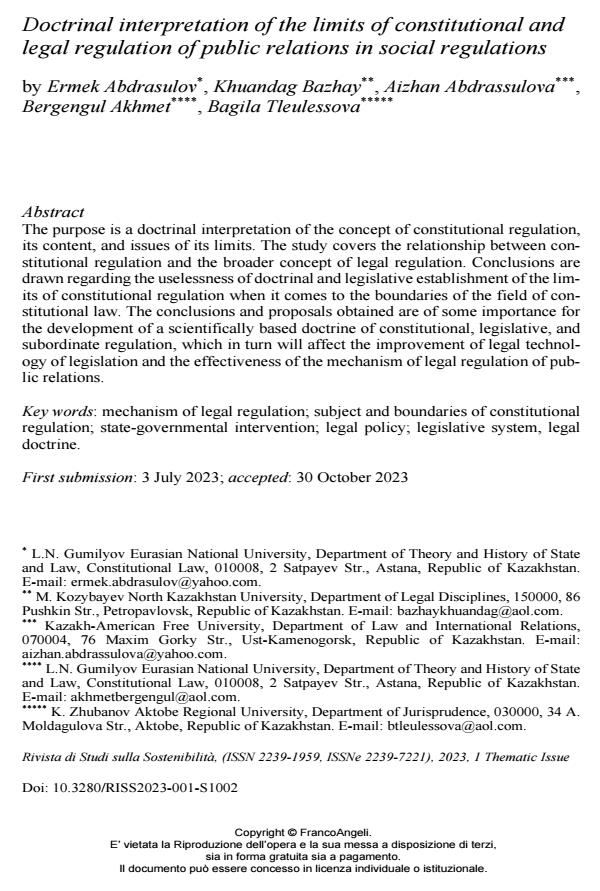Doctrinal interpretation of the limits of constitutional and legal regulation of public relations in social regulations
Titolo Rivista RIVISTA DI STUDI SULLA SOSTENIBILITA'
Autori/Curatori Ermek Abdrasulov, Khuandag Bazhay, Aizhan Abdrassulova, Bergengul Akhmet, Bagila Tleulessova
Anno di pubblicazione 2023 Fascicolo 2023/1 T.
Lingua Inglese Numero pagine 14 P. 15-28 Dimensione file 89 KB
DOI 10.3280/RISS2023-001-S1002
Il DOI è il codice a barre della proprietà intellettuale: per saperne di più
clicca qui
Qui sotto puoi vedere in anteprima la prima pagina di questo articolo.
Se questo articolo ti interessa, lo puoi acquistare (e scaricare in formato pdf) seguendo le facili indicazioni per acquistare il download credit. Acquista Download Credits per scaricare questo Articolo in formato PDF

FrancoAngeli è membro della Publishers International Linking Association, Inc (PILA), associazione indipendente e non profit per facilitare (attraverso i servizi tecnologici implementati da CrossRef.org) l’accesso degli studiosi ai contenuti digitali nelle pubblicazioni professionali e scientifiche.
The purpose is a doctrinal interpretation of the concept of constitutional regulation, its content, and issues of its limits. The study covers the relationship between constitutional regulation and the broader concept of legal regulation. Conclusions are drawn regarding the uselessness of doctrinal and legislative establishment of the limits of constitutional regulation when it comes to the boundaries of the field of con- stitutional law. The conclusions and proposals obtained are of some importance for the development of a scientifically based doctrine of constitutional, legislative, and subordinate regulation, which in turn will affect the improvement of legal technology of legislation and the effectiveness of the mechanism of legal regulation of public relations.
Parole chiave:mechanism of legal regulation; subject and boundaries of constitutional regulation; state-governmental intervention; legal policy; legislative system, legal doctrine.
Ermek Abdrasulov, Khuandag Bazhay, Aizhan Abdrassulova, Bergengul Akhmet, Bagila Tleulessova, Doctrinal interpretation of the limits of constitutional and legal regulation of public relations in social regulations in "RIVISTA DI STUDI SULLA SOSTENIBILITA'" 1 T./2023, pp 15-28, DOI: 10.3280/RISS2023-001-S1002